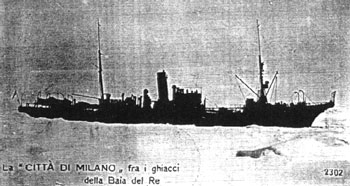|
General
Umberto Nobile
Commander of the Dirigible ITALIA
Dirigibles
became the newest hope for long range aviation after the success of
the NORGE flight to the North Pole in 1926. However, Umberto
Nobile, who served as pilot on that flight, became frantic in efforts
to make an all-Italian flight to the Pole. He planned to fly east from
Spitzbergen to chart the lands north of Russia, as well as mooring the
airship at the Pole for three weeks while a party of six made observations
on the ice. He also planned a study of the islands of the Canadian Archipelago.
A hangar at Kings Bay on Spitzbergen and the steamer CITTA DI
MILANO acted as support units. On May 15, the first part of
the program was carried out, but weather conditions grew worse. Icing
conditions slowed the ITALIA and forced it to fly low
through the fog to determine their speed and drift. Finally, they stopped
the engines and the ship rose above the clouds where they found they
were 180 miles from Spitzbergen. When they descended again, on May 25,
the icing created new problems. The ship acted erratic, finally settling
at the tail and the ITALIA struck the ice, ripping
the side of the pilot cabin and dumping the crew and contents onto the
ice. The rest of the dirigible rose into the sky and nothing more was
heard of the six men in the gondola. A remarkably complete set of equipment
was spread on the ice, even a radio was saved.
The
world was unable to interpret the radio distress calls, and the worst
was expected. The message from the ice party broadcast a daily message.
Over and over again they sent:
S.O.S.F.O.Y.N.C.I.R.C.A.
Foyn
Island, northwest of Spitzbergen, was ignored until a peasant near Archangel
deciphered the message and the search was focused on this spot. Parties
from five nations became involved, but the Russian government sent two
ice breakers and aircraft to become the most involved.
This
is a display of the communications working papers of the Russian
Rescue Expedition of
1928.
|
|

Picture side of the postcard |
|
The
flight of the dirigible ITALIA was highly publicized
by the Italian Government and the event attracted collectors to
seek philatelic mail. This card was mailed from the Base Ship
CITTA DI MILANO while it was anchored in
Spitzbergen on April 5, 1928, more than a month before the emergency
was declared.
|
|
|
The
dirigible ITALIA crashed after reaching the Pole
in 1928. An international rescue operation lasting three months
involved ten ships and twenty fliers. A Russian ice breaker
picked up the survivors.
Official
mail was canceled on the base ship CITTA DI MILANO
while incoming mail carried a two line cachet . . .
SPEDIZIONE
AEREA DI SOCCORSO
° SESTO CALENDE - KINGSBAY °
|
|
|
|
|
Cover
dated June 12, 1928 addressed to Professor Wiese, Director of
the rescue expedition, in care of the Murmansk Sea Agency and
the Military Depot No. 17, located in Leningrad.
A
marking on the right side of the envelope was apparently clipped
to remove some secret marking required to insure the secrecy
of the activity. The shipment contained parachutes for the pilots
and oil for the planes.
|
|
|
Two
waybills for the cargo of the Rescue Expedition were enclosed
in a cover addressed to Professor Wiese on June 12, 1928. The
delivery of material was sent to Murmansk for the expedition to
rescue the Airship ITALIA. |
Continued on the next page . .
.
 |
|
|